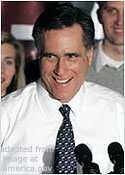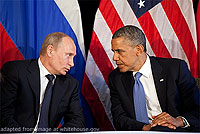U.S. Elections Deepen the Divergence Between Russia’s and Putin’s Interests

(Jamestown Foundation – jamestown.org – Eurasia Daily Monitor – Eurasia Daily Monitor: Volume 9, Issue 202 –
Pavel K. Baev – November 5, 2012)
The choice that the
United States will make tomorrow is certain to have a strong impact on US-Russia relations, but President Vladimir Putin cannot figure out what outcome will suit his interests better. Back in 2004, he opted for endorsing George W. Bush, which the 43rd US President did not find helpful or even amusing, perhaps sincerely regretting his “look-in-the-eye” insight. This time around, Putin sees no chance of gaining a modicum of personal chemistry with the next US leader. Barack Obama is a known quality and has plenty of stakes to defend in the policy of “reset” with Russia. But the irony of staying on this course is that Obama has to defend the achievements from Mr. Putin. The abrupt termination of the praiseworthy Nunn-Lugar program confirms that Putin does not share the vision of a world free of nuclear weapons, and the expulsion of the US Agency for International Development (USAID) signals the Kremlin’s desire to block the channels of “interference” in its authoritarian degeneration (Moskovskie Novosti, October 29). Obama invested much effort in building rapport with Dmitry Medvedev, and Putin could have simply simpered at those wasted investments and nothing more, if only Medvedev had not dared to challenge his supremacy in such crucial matters as the composition of the budget or the reform of the pension system (Nezavisimaya Gazeta, November 1; Finmarket, November 2).
Mitt Romney irks the Kremlin to no end with his persistent promises to show Putin real toughness and not “flexibility,” which Obama carelessly mentioned and then far from convincingly tried to explain away (Kommersant, October 30). Romney was perhaps even more careless in describing Russia as America’s “number one geopolitical foe,” but many in Moscow are thrilled about the prospect of being elevated to such a strategic status (Nezavisimoe Voennoe Obozrenie, November 2). Others reflect that it was often easier for the Soviet and Russian leaders to deal with tough-minded Republicans, and take note of the surprise business visit to Moscow of the candidate’s son Matt Romney (Moscow echo, November 2). One consideration that rings alarms in the Kremlin is that many experts in the Republican camp worked in the second Bush administration and shaped the course of fostering the “color revolutions,” which remain a menacing specter for Putin, who presses further with targeted repressions and refuses to acknowledge the build-up of domestic discontent (Gazeta.ru, November 1).
What makes these US elections particularly irritating for Putin is their most untimely demonstration of the value of political competition, which involves a choice between substantially different platforms informed by fair and content-rich debates. Seeking to corrupt this impression, the official propaganda spins the report of the Central Electoral Commission, which criticizes “systematic and large-scale violations of legislation,” and makes an issue of the less than lukewarm welcome of Organization for Security and Cooperation in Europe (OSCE) observers in Texas (Grani.ru, October 31). A good argument could indeed be made for a transition to direct elections that would guarantee that the US president is elected by majority vote, but there is hardly any doubt that Americans would give this argument every consideration before deciding to abandon the tradition of the Electoral College (New Times, October 30).
Interest in US elections is always high in Russia, but this year it is mixed with reflections on recent parliamentary elections in Georgia and Ukraine. In the former, the strength of character shown by President Mikhail Saakashvili in accepting the narrow defeat after the bitterly fought campaign might lead to normalization of relations with Russia (Nezavisimaya Gazeta, November 2). In the latter, most Russians shared the Kremlin’s expectations that the Party of Regions, led by President Viktor Yanukovich, would score a solid victory, but in fact, it has managed to win only a slim majority of seats registering barely 30 percent support on the party ballot (Kommersant, October 30). Most commentators agree that in the Ukrainian Verhovna Rada, the traditional pattern of quarreling and bargaining endures, but the massive electoral manipulations and fraud signify a curtailing of democracy (Gazeta.ru, October 30). One worrisome change is the strong support for the extreme nationalist party Svoboda (Liberty), which corresponds to the fast growth of nationalist groups in Russia as demonstrated by their march in downtown Moscow last Sunday (Nezavisimaya Gazeta, November 1; Gazeta.ru, November 2).
It is remarkable that with all the polarization of views in Russian society, the expressed preferences for the outcome of the US elections are much the same as in most European countries: 41 percent of respondents want to see Obama re-elected, while only 8 percent prefer Romney, and the rest are undecided (Levada.ru, October 30). Russians understand perfectly well that the absolutely central issue in the choice Americans are making is the economy. The Russian public may have instinctive mistrust in the recipes for recovery that Romney is selling, but it is clear that the gloating over US financial troubles has completely evaporated and a sober reckoning of Russia’s economic vulnerability to these troubles has prevailed. There is also understanding that the main foreign policy problem for a US president in the weeks and months after the elections is the escalating turmoil in the Middle East. And while mistrust in US “hegemonic ambitions” is still strong, concerns about the limitations on the West’s ability to induce stability in the newly-perturbed nests of radicalism from Benghazi to Aleppo are diluting the residual and officially encouraged anti-Americanism (Kommersant, Nezavisimaya Gazeta, November 2).
The message from the US elections that many Russians are internalizing is about political competition as the natural avenue for change, and this brings into sharper focus Putin’s hostility to any change in the system of rigidly centralized and increasingly dysfunctional controlas well as his fear of competition. He is no longer seeking opportunities to cultivate personal ties with Western peers and seeks only their indifference to the brewing political crisis in Russia. He suspects the West in undermining his vision of a powerful and proud Derzhava and refuses to admit that his reliance on corruption, misinformation and repression propels Russia toward a cataclysm, which nobody in the West wishes to deal with. Tomorrow, the United States will help Russia recognize how much it needs legitimate leadershipand Putin stands in the way.

